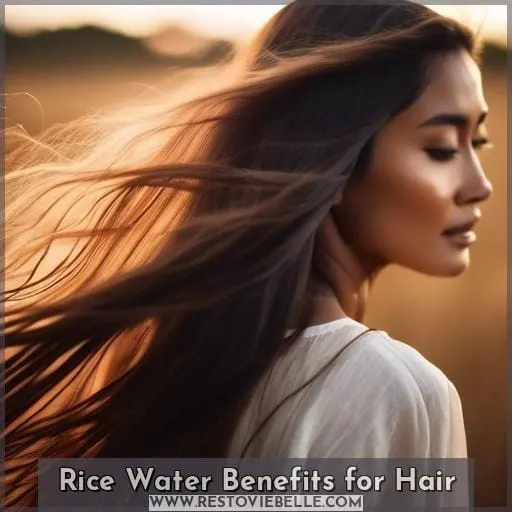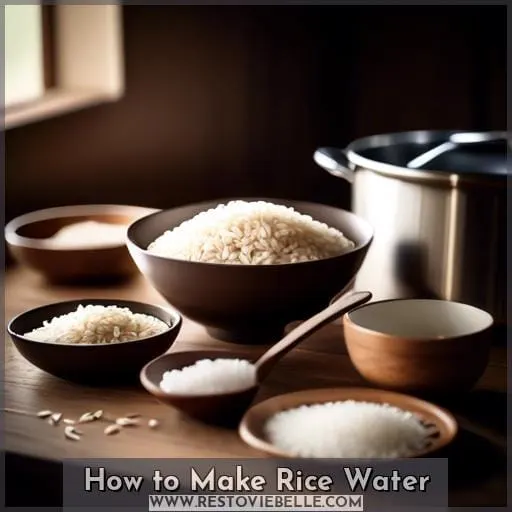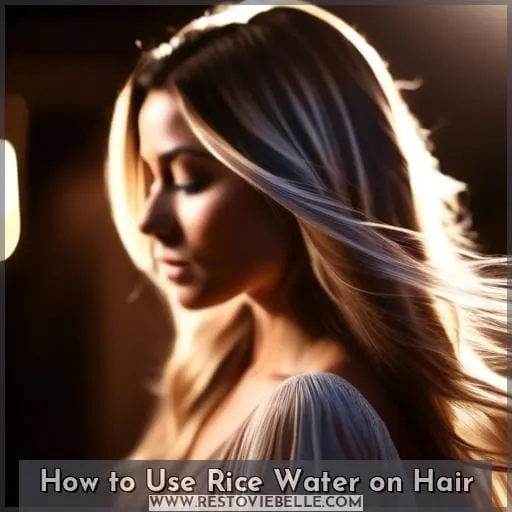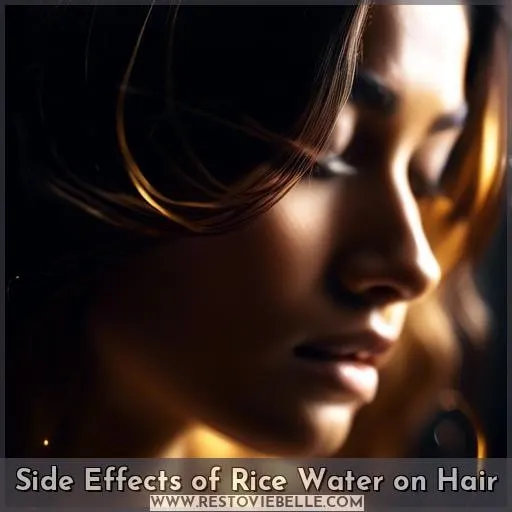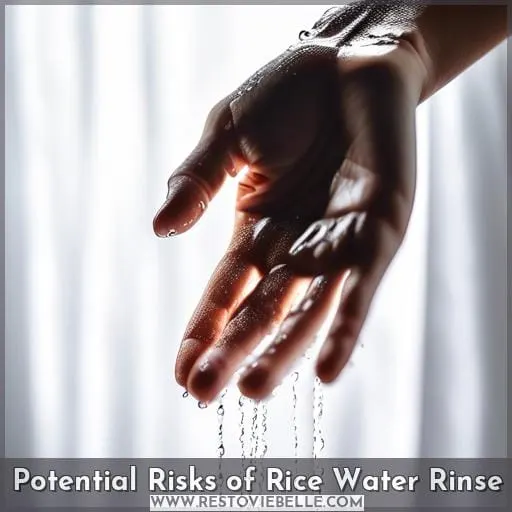This site is supported by our readers. We may earn a commission, at no cost to you, if you purchase through links.
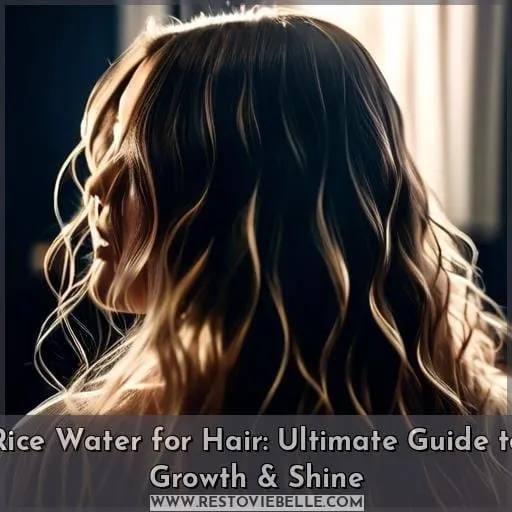 Discover the ancient secret that’s making a modern-day comeback: rice water for hair. This simple yet intriguing remedy, steeped in history from the lush fields of Asia, has sparked a global beauty revolution.
Discover the ancient secret that’s making a modern-day comeback: rice water for hair. This simple yet intriguing remedy, steeped in history from the lush fields of Asia, has sparked a global beauty revolution.
But is it the panacea for achieving lustrous, strong, and voluminous hair as countless anecdotes suggest? Delve into the science and tradition behind rice water, exploring its potential to transform your hair care routine.
From enhancing hair growth and elasticity to increasing volume, we unveil how this natural elixir could be the key to unlocking the ultimate hair growth and shine.
Table Of Contents
- Key Takeaways
- Rice Water Benefits for Hair
- How to Make Rice Water
- How to Use Rice Water on Hair
- Side Effects of Rice Water on Hair
- Who Should Use Rice Water
- Potential Risks of Rice Water Rinse
- Frequently Asked Questions (FAQs)
- Can rice water be used to treat specific scalp conditions, such as psoriasis or seborrheic dermatitis?
- How does the pH of rice water compare to the natural pH of hair, and can it affect hair health?
- Are there any long-term studies on the effects of continuous use of rice water on hair?
- Can rice water interact with hair dyes or chemical treatments, potentially affecting their results?
- Is there a difference in the efficacy of rice water on hair when using white rice versus brown rice or other varieties?
- Conclusion
Key Takeaways
- Rice water is believed to offer several benefits for hair, including promoting growth, enhancing elasticity, increasing volume, taming frizz, and curing dandruff, although scientific evidence to fully support these claims is inconclusive.
- There are various methods to prepare rice water for hair treatment, including soaking, boiling, and fermenting, with each method having its own set of advocates who claim different benefits, particularly noting that fermented rice water may have more antioxidants.
- While rice water is generally considered safe for most hair types and can enhance the strength and shine of fine or dull hair, it can also lead to side effects such as protein and starch buildup, dryness, flakiness, and irritation in sensitive skin if overused.
- It is recommended to use rice water in moderation, especially for those with low porosity hair, and to start with a lower frequency of application to monitor the hair’s response, adjusting usage based on the hair’s condition and needs.
Rice Water Benefits for Hair
If you’re looking to enhance your hair’s health, you might consider incorporating rice water into your hair care routine.
Rice water is rich in vitamins and minerals that can potentially strengthen hair roots, aid in faster growth, and repair damaged hair.
While the scientific evidence isn’t conclusive, many users report improvements in hair elasticity, volume, and overall hair strength when using rice water as part of their regimen.
Promotes Hair Growth
Rice water has been touted for its potential benefits for hair care, including promoting hair growth, enhancing elasticity, increasing volume, taming frizz, and curing dandruff. These claims are supported by both anecdotal evidence and some scientific research.
The starchy water, which is rich in vitamins B, C, and E, inositol, amino acids, and antioxidants, is believed to strengthen hair roots, aid in faster growth, repair damaged hair, and protect hair from breakage.
To prepare rice water, one can use the soaking method, where 1 cup of uncooked rice is rinsed and then soaked in 2-3 cups of water for 30 minutes before straining. There are also other methods such as boiling or fermenting the rice water, which may enhance its antioxidant properties.
The application of rice water involves shampooing the hair, pouring the rice water over the hair, massaging it into the hair and scalp, leaving it on for up to 20 minutes, and then rinsing thoroughly. It’s recommended to use rice water between shampooing and conditioning, and not as a replacement for conditioner.
While rice water is considered safe for most people, there are minimal risks associated with its use. Individuals with eczema, alopecia, or low porosity hair should exercise caution, as rice water can lead to protein and starch buildup, which can damage the scalp and slow hair growth if overused.
The debate between natural and synthetic products continues, with limited scientific evidence supporting either side. Personal preference and experience often determine the perceived effectiveness of these products.
It’s important to note that natural products can cause skin problems, while synthetic products can be beneficial for wound healing.
In summary, rice water is a traditional remedy with potential hair care benefits, but it should be used with caution to avoid side effects such as protein and starch buildup. More research is needed to fully substantiate the claims of its benefits for hair and skin health.
Enhances Hair Elasticity
Following the boost in hair growth, rice water’s rich inositol content and rice protein work wonders in enhancing hair elasticity.
This natural concoction reduces surface friction, allowing for smoother, shinier hair.
The antioxidants present play a crucial role in preventing hair damage, contributing to stronger, thicker strands.
Embrace the power of rice water for not just length, but also for the resilience and vibrancy of your hair.
Increases Hair Volume
Rice water is acclaimed for its potential benefits for hair health, including promoting hair growth, enhancing elasticity, and increasing volume. It’s believed to contain inositol, a carbohydrate that can potentially strengthen hair, and fermented rice water may offer more antioxidants, which combat hair cell damage.
The preparation of rice water can be done through various methods, such as soaking, boiling, or fermenting. The soaking method involves rinsing and soaking rice in water for about 30 minutes before straining.
Fermentation, which involves leaving soaked rice water at room temperature for up to two days, is said to increase the antioxidant content.
To use rice water as a hair rinse, one should first shampoo their hair, then pour rice water over it, massage into the scalp and hair, leave it on for up to 20 minutes, and rinse thoroughly. This process can be repeated as part of a regular hair care routine but shouldn’t replace conditioner.
While rice water is generally safe, excessive use can lead to protein and starch buildup, potentially damaging the scalp and slowing hair growth. It’s not recommended for daily use, and those with low porosity hair should use it in moderation.
Rice water can benefit most hair types, particularly fine or dull hair, curly hair, and those looking to promote hair growth and thickness. However, individuals with conditions like eczema or alopecia should exercise caution.
There are hair products that incorporate rice water, such as MyKirei by KAO Nourishing Shampoo, Briogeo Don’t Despair Repair Rice Water Protein + Moisture Strengthening Treatment, and Pattern Beauty Treatment Mask.
In summary, rice water is a traditional remedy with anecdotal support for its benefits to hair health. It’s easy to prepare and use, with minimal risks for most people. However, scientific evidence is limited, and personal experience often dictates its effectiveness.
How to Make Rice Water
Rice water has been touted for its potential benefits for hair and skin, with anecdotal evidence suggesting it can improve hair strength, texture, and growth, as well as aid in skin healing. To make rice water, you can use the soaking method, which involves rinsing half a cup of uncooked rice and then soaking it in 2-3 cups of water for 30 minutes before straining.
Alternatively, the boiling method involves cooking rice with double the usual amount of water and straining the excess water for use. Fermented rice water, which is left to stand at room temperature for up to 2 days before straining, may have additional benefits due to a higher antioxidant content.
For hair care, rice water can be used as a rinse after shampooing. The process includes pouring the rice water over the hair, massaging it into the scalp and hair, leaving it on for up to 20 minutes, and then rinsing thoroughly with warm water.
While rice water is generally safe for most people to try, those with certain conditions like eczema or alopecia should proceed with caution, and it’s not recommended for daily use due to the potential for protein and starch buildup.
The choice between natural remedies like rice water and synthetic hair care products often comes down to personal preference and experience. While natural products can sometimes cause skin problems, synthetic products may offer benefits such as wound healing.
It’s important to note that scientific evidence supporting the benefits of rice water for hair and skin is limited and more research is needed.
Soaking Method
Soak 1/4 cup rice in 2 cups room temperature water for 30 minutes. Swirl occasionally.
Strain liquid into a bowl.
The soaking method extracts nutrients like B vitamins while avoiding excess starch.
Use plain or ferment up to 48 hours for more antioxidants.
Steps for Soaking Rice
Soak 1 cup of uncooked white or brown rice in 2-3 cups of room temperature water for 30 minutes in a glass, ceramic, or plastic bowl.
The optimal rice to water ratio is 1:2-3 for extracting nutrients like inositol to get shinier, softer hair like the Yao women.
Fermented Vs. Plain Rice Water
Fermentation increases the rice water’s antioxidant content and lowers its pH.
This allows it to last longer but may have harsher effects on some hair textures.
Monitor your hair’s condition closely when using fermented rice water.
Benefits of Fermentation
When fermented, rice water contains more antioxidants.
These antioxidants can combat protein and UV damage to the hair, promoting healthier growth and shine.
Boiling Method
After soaking, you can also make rice water by boiling rice.
Simply add 1 cup rice to 2 cups water and boil for 15 minutes.
Then strain the liquid and allow it to cool completely before storing in the refrigerator for up to 5 days.
Using white or brown rice yields different properties.
Steps for Boiling Rice
Bring water to a boil in a pot.
Add rice, using a 2:1 water-to-rice ratio.
Boil for 15 minutes, then remove from heat.
Allow to cool before straining the liquid into a bowl through a sieve to separate the rice water.
How to Use Rice Water on Hair
When considering the use of rice water for hair care, it’s important to understand the application process and how often it should be used.
You can apply rice water to your hair after shampooing, massaging it into your scalp and hair, and then leaving it on for up to 20 minutes before rinsing thoroughly.
While some individuals use rice water treatments frequently, it’s generally advised not to use it daily to avoid protein and starch buildup, which can lead to damage and dryness.
Instead, using rice water once a week or every couple of weeks may be more beneficial, especially for those with low porosity hair or sensitivities.
Application Process
After making rice water using your preferred method—soaking, boiling, or fermenting—you’re ready to apply it to your hair.
Start by washing your hair with shampoo to ensure it’s clean.
Next, pour the rice water over your hair, saturating both the strands and scalp. For an enhanced experience, gently massage your scalp to stimulate blood flow and nutrient absorption.
Depending on your hair porosity, you may need to adjust the leave-in duration; typically, up to 20 minutes is sufficient. If you have low porosity hair, which tends to resist moisture, be cautious not to overdo it as this could lead to dryness.
After the treatment, rinse your hair thoroughly with warm water.
Regular use can strengthen hair roots, aid in faster growth, and repair damaged hair, but moderation is key to prevent any adverse effects.
Frequency of Use
When using rice water as a hair rinse, limit applications to 1-2 times per week. Overusing rice water can lead to an accumulation of protein and starch that creates buildup, potentially clogging follicles and slowing growth.
However, regular use stimulates blood flow to promote faster growth while enhancing volume and elasticity. For best results, concentrate applications on the roots and ends which are most vulnerable.
Usage varies depending on hair type and condition – damaged or dull hair benefits from more frequent rinses while healthy hair requires less. Regardless of frequency, thoroughly rinse rice water from hair after 10-20 minutes before conditioning as usual.
Side Effects of Rice Water on Hair
While rice water is often touted for its potential benefits for hair health, such as promoting growth and enhancing elasticity, it’s important to be aware of its potential side effects.
Excessive use of rice water can lead to protein and starch buildup on the scalp and hair, which may cause dryness, flakiness, and even slow hair growth. This buildup can also make the hair feel stiff and over-processed, leading to damage and breakage.
It’s recommended not to use rice water treatments daily and to be cautious if you have conditions like eczema or alopecia, as rice water can irritate sensitive skin.
Protein and Starch Buildup
Excessive use of rice water can lead to protein and starch buildup on your hair and scalp. This buildup can have detrimental effects, including weighing down your strands, blocking your follicles, and preventing moisture from properly penetrating the hair shaft.
Over time, this can make hair dull, dry, and brittle. It may also irritate the scalp, potentially causing flaking or itching. Those prone to dryness concerns should take extra precaution, as rice water’s high protein content could over-process hair and exacerbate existing conditions.
To prevent buildup, limit rice water rinses to once or twice a week. Be sure to thoroughly rinse it out and follow up with a moisturizing conditioner. Moderation is key to harnessing the benefits of rice water while avoiding adverse effects.
Dryness and Flakiness
Excessive protein and starch from the rice water rinse can lead to dryness and flakiness of your hair and scalp.
Signs to watch out for include:
- tightness,
- itchiness, and
- visible flakes after rinsing out the treatment.
To prevent this, properly dilute the rice water and don’t overdo the treatments. Afterwards, use a moisturizing shampoo and conditioner suited for your hair type. Consider applying a hair oil or scalp serum post-application to soothe the skin if any irritation occurs.
Who Should Use Rice Water
If you’re considering incorporating rice water into your hair care routine, it’s important to understand who can benefit from its use.
Rice water is generally suitable for most hair types and can particularly enhance the strength and shine of fine or dull hair. It can give elasticity to curly hair and promote growth and thickness in all strands.
However, those with low porosity hair should use rice water in moderation to avoid protein and starch buildup, which can lead to dryness and brittleness.
Suitable Hair Types
Rice water is an effective hair treatment for a range of hair types. Fine or dull hair benefits from its strengthening and shining properties. Curly hair gains elasticity, while hair growth and thickness are promoted in all hair types.
Even low porosity hair can benefit from rice water, but it should be used in moderation.
Rice water can be used as a pre-poo treatment or a rinse between shampooing and conditioning.
Precautions for Certain Conditions
While rice water offers a range of benefits, there are precautions for certain conditions. If you have sensitive skin or scalp, you may experience allergic reactions, scalp irritation, or skin irritation.
Nutrient deficiency can be another concern, as rice water doesn’t contain all the nutrients your hair needs.
In cases of hair damage, excessive use of rice water can lead to protein buildup and further damage.
It’s best to consult a healthcare professional before using rice water if you have any underlying hair or skin conditions.
Benefits for Dermatitis
Rice water may promote skin health if you have dermatitis. The starch acts as a protective barrier on damaged skin, while the fermented liquid’s antioxidants combat inflammation.
Using rice water as a rinse or compress could aid healing of irritated patches. However, discontinue use if you experience adverse reactions.
Application Methods
You should soak or massage rice water into your hair and scalp. Optimal methods include:
- Adding essential oils
- Leaving on for 10-20 minutes
- Using lukewarm water to rinse
Gently scrubbing while rinsing balances pH and boosts circulation for healthier hair.
Potential Risks of Rice Water Rinse
While rice water is often touted as a natural remedy for hair health, it’s important to be aware of potential risks associated with its use.
Overuse of rice water can lead to protein and starch buildup, which may damage the scalp and slow hair growth. Additionally, those with certain skin conditions, such as eczema or alopecia, should exercise caution, as rice water could exacerbate these issues.
It’s recommended to consult with a healthcare provider before using rice water as a treatment for hair loss, especially since there are FDA-approved medications for various types of alopecia.
Overuse Consequences
Though rice water’s hair benefits are touted, beware overuse. Excessive protein and starch can build up, damaging follicles and slowing growth.
Flakiness, breakage, and over-processed strands may also result. Research on efficacy is limited – assess your hair’s needs before committing.
Alternate with other treatments or use more moderately if experiencing adverse effects. While some report stellar outcomes from frequent use, individual hair can respond differently.
Pay attention to your scalp and strands, adjusting application as required. Moderation helps minimize risk of overuse consequences like protein overload.
Sensitivity Considerations
When considering the use of rice water for hair care, it’s important to be aware of potential sensitivity issues that could arise.
- Allergic Reactions: If you’re allergic to rice, avoid using rice water as it could trigger an allergic response.
- Scalp Irritation: Individuals with sensitive scalps or conditions like eczema or psoriasis may experience irritation or eczema flare-ups.
- Skin Problems: Even natural products like rice water can cause skin problems, so it’s crucial to monitor for any adverse reactions.
- Hair Damage: Overuse of rice water, especially if it’s left on the hair for too long, can lead to protein and starch buildup, potentially resulting in hair damage.
It’s generally recommended to use rice water in moderation and to conduct a patch test before applying it to your entire scalp, particularly if you have a history of skin sensitivity or allergies.
Frequently Asked Questions (FAQs)
Can rice water be used to treat specific scalp conditions, such as psoriasis or seborrheic dermatitis?
Rice water isn’t a proven treatment for scalp conditions like psoriasis or seborrheic dermatitis.
How does the pH of rice water compare to the natural pH of hair, and can it affect hair health?
Rice water, a potion as ancient as time, whispers secrets of beauty from the East, where it has been a cornerstone of hair care rituals for centuries.
Its pH, slightly higher than the natural 5 to 5 range of your hair, acts as a gentle alchemist, transforming the canvas of your locks.
When fermented, this elixir harmonizes with your hair’s natural pH, becoming a bridge between tradition and modernity, promising to mend, fortify, and rejuvenate.
Are there any long-term studies on the effects of continuous use of rice water on hair?
There are no long-term studies specifically focusing on the continuous use of rice water on hair.
Most evidence supporting its benefits, such as improved hair growth and elasticity, is anecdotal or based on short-term observations.
Can rice water interact with hair dyes or chemical treatments, potentially affecting their results?
Rice water, a potion as ancient as time, whispers secrets of beauty from the past, promising to weave magic into the strands of the modern age.
Yet, when it dances with the vibrant hues of hair dyes or the transformative powers of chemical treatments, does it alter their spellbinding effects? The answer lies in the delicate balance of nature and science.
Rice water, rich in nutrients, can indeed be used on color-treated hair without dimming its luster. Its natural composition nourishes and strengthens, potentially enhancing the vibrancy and health of treated locks.
However, caution is advised when mingling it with other hair products, as interactions could arise, especially with those containing contrasting chemical properties. Always embark on this journey with a mindful approach, ensuring that the harmony between rice water and your hair’s chemical companions remains undisturbed.
Is there a difference in the efficacy of rice water on hair when using white rice versus brown rice or other varieties?
There’s no definitive evidence suggesting a significant difference in the efficacy of rice water on hair when using white versus brown rice or other varieties.
However, some experts recommend long grain white rice over others due to its lower protein content, which might be preferable for those concerned about protein overload. Brown rice, being richer in protein, could potentially lead to too much protein in the hair, which isn’t ideal for all hair types.
Ultimately, the choice of rice may depend on individual hair needs and goals, with all types offering nutrients beneficial for hair health.
Conclusion
Like a well-nourished plant that thrives with the right watering schedule, your hair too can potentially flourish with the use of rice water.
This ancient remedy, now revived in modern beauty routines, may offer benefits such as improved hair growth, elasticity, and volume. While the science behind rice water for hair is still evolving, the tradition and anecdotal evidence suggest it could be a natural boost for your locks.
